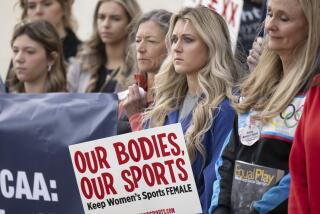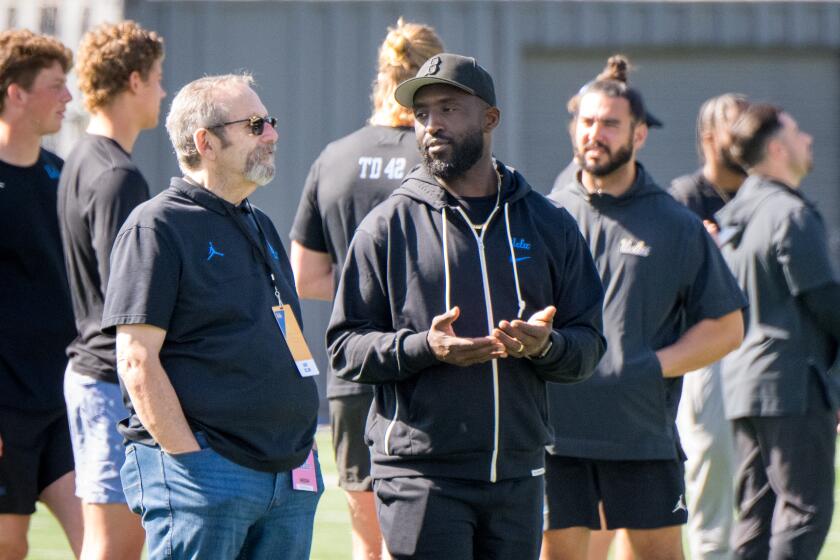Caster Semenya loses gender case in bid to continue competing as a woman

In a landmark ruling that touches upon complex issues of gender in sport, South African runner Caster Semenya has lost her appeal against track officials who may now proceed with a controversial rule that defines her and other female athletes by their body chemistry.
The international Court of Arbitration for Sport ruled against Semenya on Wednesday, declaring that the international track federation may regulate the participation of women with naturally high testosterone levels.
The IAAF will now present these women with a stark choice: Either take medication to alter their chemistry or race against men.
The CAS panel stated that “such discrimination is a necessary, reasonable and proportionate means of achieving the IAAF’s aim of preserving the integrity of female athletics.”
The majority decision represents a major, off-the-track defeat for Semenya, who has two Olympic gold medals in the 800 meters but has long endured scrutiny because of her fast times, broad shoulders and muscular build. She has 30 days to consider taking her appeal to Switzerland’s tribunal court.
“I know that the IAAF’s regulations have always targeted me specifically,” Semenya said in a statement. “For a decade the IAAF has tried to slow me down, but this has actually made me stronger. The decision of the CAS will not hold me back.”
The new rule, scheduled to take effect next week, has nothing to do with cheating or performance-enhancing drugs; instead, it was devised for women with natural “difference of sexual development,” or DSD, meaning they have a testosterone level that exceeds the normal range for females.
Federation officials claim this condition, which they estimate occurs in seven of every 1,000 women runners at the elite level, represents an unfair advantage because increased testosterone can equate to greater strength and speed.
They insisted that their rule covering events from the 400 meters to the mile would be administered with “care and compassion.”
Sign up for our daily sports newsletter »
“It is each athlete’s responsibility, in close consultation with her medical team, to decide whether or not to proceed with any assessment and/or treatment,” the IAAF said.
Semenya or any other athlete with DSD would likely have to begin treatment quickly to attain the mandated hormone level and be deemed eligible for the world championships in Doha, Qatar, this fall.
Though the 165-page CAS decision favored regulation, judges acknowledged they had “serious concerns” about athletes unintentionally exceeding the maximum testosterone level or suffering side effects from hormone suppression.
University of Colorado professor Roger Pielke Jr., an expert witness who testified on Semenya’s behalf at a CAS hearing in February, said there needs to be more research.
“The evidence base is thin … and yet the bizarre thing is, they’re going to plow ahead with the regulation and the remedy they have proposed,” Pielke said. “You can do that with software on your phone, but when you do it with humans, it’s a little bit questionable.”
The reaction in South Africa was similarly negative.
“Naturally we are disappointed with the judgment,” national sports minister Tokozile Xasa said. “As the South African government, we have always maintained that these regulations trample on the human rights and dignity of Caster Semenya and other women athletes.”
This isn’t the first time the sports world has wrestled with defining what it means to be female.
As far back as the 1930s, some Olympic competitors were asked to disrobe and stand before officials to prove they were women. A chromosome test was later tried and abandoned after it failed to account for certain rare conditions.
The IAAF switched to a testosterone-based test that was initially shot down in 2015, when Indian sprinter Dutee Chand prevailed in her appeal. In that ruling, CAS asked for more scientific evidence.
This time, Pielke and other experts called by Semenya’s lawyers testified that research still hasn’t proved that elevated testosterone is a reliable predictor of enhanced performance. Another prominent argument questioned why women should be singled out when many top male athletes enjoy genetic advantages.
Tennis great Billie Jean King, one of numerous sports stars who supported Semenya, called the policy “barbaric, dangerous and discriminatory.”
But some in elite female athletics, including British marathoner Paula Radcliffe, publicly sided with regulation.
Arbitrators ultimately agreed with track officials, who had argued: “This standard is necessary to ensure fair competition for all women. Indeed, without it, we risk losing the next generation of female athletes, since they will see no path to success in our sport.”
Follow @LAtimesWharton on Twitter
More to Read
Get our high school sports newsletter
Prep Rally is devoted to the SoCal high school sports experience, bringing you scores, stories and a behind-the-scenes look at what makes prep sports so popular.
You may occasionally receive promotional content from the Los Angeles Times.







